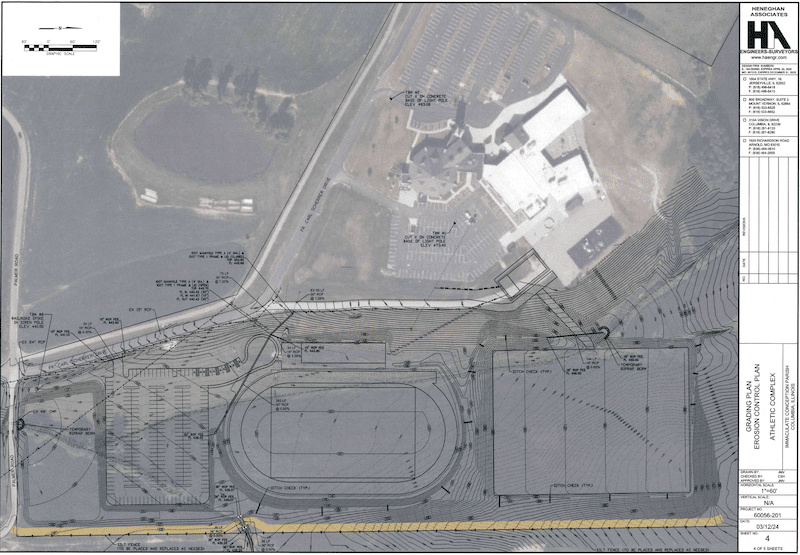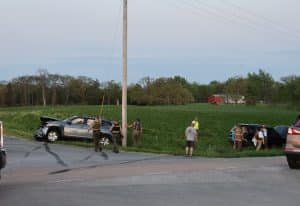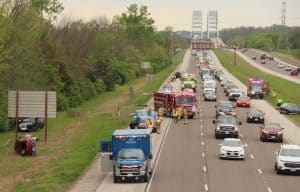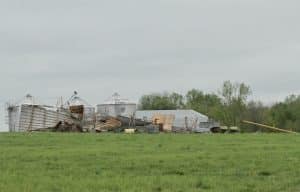LSVs in Columbia?
A Columbia man is halfway to his goal of obtaining enough signatures to revisit the possibility of allowing low-speed vehicles within Columbia city limits.
The issue had been proposed in Columbia in October 2010, shortly after the Illinois General Assembly passed Public Act 096-1434 which allows use of LSVs on streets with a speed limit of no more than 30 miles per hour.
An LSV, according to the act, is a vehicle “that is capable of attaining in one mile a speed of more than 20 miles per hour but not more than 25 miles per hour.”
The Columbia City Council Committee of the Whole recommended the city “accept and comply with the provisions” of the act, although no formal ordinance has since been passed to allow use of such vehicles in Columbia.
John Roades would like to see the issue revisited.
Roades has set up an online petition with the goal of having an advisory referendum placed on the Nov. 5 ballot which would ask if Columbia residents would approve or disapprove of allowing LSVs on city streets.
“I’m trying to do it the right way,” Roades told the Republic-Times.
According to Roades, if he can obtain 227 signatures from Columbia residents – 5 percent of the number of voters in the most recent election – the city would be required to place an advisory referendum on the upcoming ballot posing the question about LSV use within the city limits.
As of press time, Roades had collected 120 signatures.
Roades provided several reasons why he would like to see LSVs on city streets.
First of all, he cites the high cost of gas.
On his petition page at change.org, Roades states, “As a resident of Columbia, I have seen firsthand how the escalating gas prices are affecting our community. The financial burden is immense and it’s time we explore alternative means of transportation.”
He also added that LSVs could potentially increase local revenue.
“If you’re riding (an LSV), you have to stay in Columbia,” Roades reasoned, which he believes would lead to increased local fuel and possibly retail sales resulting in more tax money for the city.
He said several local businesses have spoken in favor of the proposition, including Bob Brockland Buick GMC, Ace Hardware and Hytech Auto Trim.
Roades also pointed to the inherent fun associated with using LSVs.
“Operating an LSV isn’t just about getting from point A to B; it’s about enjoying the journey. Every person I know who operates an LSV does so with a smile on their face,” Roades said.
He suggested that use of LSVs in town would go a long way in creating the perception of Columbia as a fun tourism destination.
“Columbia is a good community with a view of the river,” Roades said, “LSVs could transform the area” by allowing ease of travel throughout the city from travel spots such as the upcoming Franklin Yard complex off South Main Street.
He also argued that use of LSVs could open up parking spots in town and make conventional vehicle travel easier in Columbia.
Roades did acknowledge the concerns of using LSVs in the city.
“I think it’s mostly the older (aldermen), but people always talk about Route 3 and say ‘what if?’” Roades said, referring to safety issues with LSVs and the state highway that runs through the city.
Roades said state law already prohibits use of LSVs on streets with speed limits over 30 miles per hour, so he suggests strict punishments for those caught using an LSV on Route 3 if they become legal.
He also said there is a concern LSVs would encourage driving while intoxicated.
“There are 10 percent of people who are going to break the law regardless. They’re still going to drink and drive. Would you rather they be driving a (multi-ton truck) or an LSV?” Roades asked.
“I don’t know why it’s contentious,” Roades continued, pointing to larger cities such as Peoria and smaller local villages such as Valmeyer, Millstadt or Hecker which allow use of LSVs in some capacity.
He also suggested the city could issue vehicle-specific stickers similar to state license plate registration to ensure compliance with local statutes and other administrative concerns.
“I’m not trying to be a thorn in the side of the city. City council can add restrictions,” Road concluded. “I just want to see it go to a vote. If it passes, that will tell the council this is something residents want. If it doesn’t pass. I’ll move on.”
Columbia City Administrator Doug Brimm told the Republic-Times he had “heard something about a small push for golf carts,” but had not been contacted directly regarding allowance of similar vehicles in the city.
To learn more or sign the petition, visit change.org/p/legalize-low-speed-vehicles-on-columbia-illinois-city-streets.
Elsewhere on the city streets, residents of Pioneer Ridge Subdivision will have to wait a few more weeks before a road hazard will be fixed.
A resident sent the Republic-Times a picture of a pothole surrounded by orange and white cones at the intersection of Eastwood Drive and Sunnyhill Lane which had been there for two months, according to the email.
Brimm said a concrete replacement program for the city was passed several weeks ago, but the program will not commence operations until mid-July.
Brimm added the necessary contracts were executed last week and the Pioneer Ridge situation is “first on the list to be addressed.”
In other business, Columbia City Council met last Monday with a relatively light agenda, although not in its usual location.
Due to the air conditioner not working in the council chambers, the meeting was moved just before it began, leading to the meeting not being livestreamed over Facebook as usual due to the last-minute change in venue.
During the June 17 meeting, aldermen passed an ordinance which pushes back the start date of the business district which was recently approved in the northern part of the city.
According to an agenda report, “due to the nature of several proposed developments within the district boundary, it will be advantageous to delay the enactment of the business district, as well as the imposition of the related taxes until Jan. 1, 2025.”
The original enactment date was July 1, 2024.
Aldermen also discussed a preliminary plat and community unit plan-type proposal for the 80-unit residential subdivision Timber Rock Estates along Columbia Quarry Road just south of Bluffside Road on property which was formerly Fairfield Country Club.
The Columbia Planning Commission unanimously approved recommendation of the preliminary plat.
The agenda report noted that as a condition of the annexation agreement for the property, “city staff has engaged the developer in discussions regarding the appropriate amount to be escrowed to be used solely toward future roadway improvements to Columbia Quarry Road.”
During the May 13 meeting, the planning commission recommended approval of the community unit plan by a vote of 6-1.
Community unit plans ask for variance on aspects of subdivision code, including setbacks and lot sizes.
The subdivision will be considered at a future meeting.
Another item for discussion only was a request by Immaculate Conception Parish and Catholic School concerning a development of athletic fields and improved parking on the church property near Palmer Road.
In a letter to the city, a parish trustee wrote, “depending on our fundraising efforts, the entire area shown on the permit drawings may or may not be able to be completed in the normal timeframe of the project. It may be necessary for us to phase the construction of the parking lot. If phased, it is our intention to grade the remaining area of the parking area with soil material to the finished pavement elevation, so that the entire area is constructed to the finish elevations shown on the permit drawings… we are also requesting to delay the placement of the asphalt on the rock base of the parking area due to settlement concerns.”
The letter stated the parish wished to delay applying asphalt for up to five years, but they would place asphalt or concrete on the ADA parking areas and access routes to the athletic fields.
According to city code, all off-street parking is required to be surfaced with cement concrete or asphalt.
According to the agenda report, “a proposed agreement has been drafted, which memorializes the understanding between the city and Immaculate Conception Parish with regard to a timeframe for required improvements.”
The next meeting of the Columbia City Council is at 7 p.m. Monday, July 1, at City Hall.







